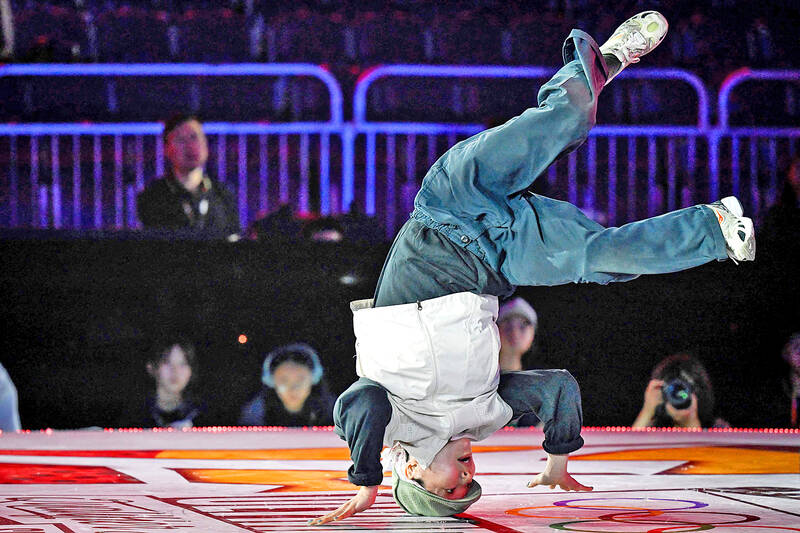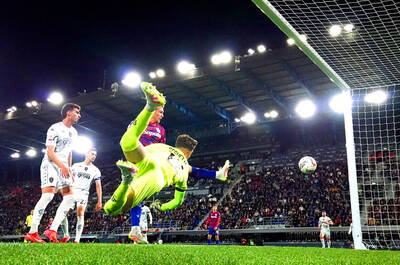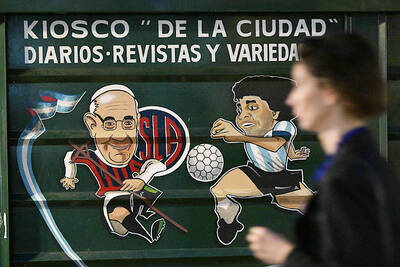At 40, Japanese competitive breakdancer Ayumi Fukushima has been busting moves for longer than some of her rivals have been alive.
The former kindergarten teacher won a qualifier in Shanghai and is in pole position for a prized spot at the Paris Olympics.
A repeat performance in Budapest next month would send her to this summer’s Games as one of the favorites for gold.

Photo: AFP
Breakdancing, or “breaking” as the sport is officially called, would make its Olympic debut in the French capital.
“I’m old, but I don’t feel too much old,” Fukushima said in English after her victory in China at the weekend.
Fukushima has long been a trailblazer for “B-girls” — female breakdancers — in what has traditionally been a male-dominated scene.
In 2017, she became the first woman to compete at the Red Bull BC One World Finals.
She has since won at the 2021 WDSF World Breaking Championship in Paris, where the competition was split into men and women categories.
She also took bronze at the 2022 World Games and last year’s Asian Games in Hangzhou, China.
Fukushima first dabbled in breakdancing as a shy 21-year-old student.
“In my generation it was kind of normal to start when we’re in university,” she said in Shanghai, where she topped the B-girl competition. “But these days most of the people start when they’re kids.”
Fukushima never thought she would have a chance to compete in the Olympics.
Given her age, it could be her first and last shot at it.
“It’s a new thing for us, for the Olympics, so I’m really happy to be in this process,” she said.
Japan has long been a breakdancing powerhouse, with three Japanese B-girls and one B-boy making it onto the podium in Shanghai on Sunday.
“All the young people are very strong,” Fukushima said of her teammates. “It’s not only winning, we enjoy this moment.”
For years, Fukushima balanced her day job as a teacher with her role as a member of a dance crew based in Kyoto.
She has cut back on her teaching duties in the past few months, saying that she is now “more focused on dancing.”
However, she carves out time to give dance classes to young children, whom she hopes will bring the fledgling sport to greater heights.
“Everywhere I go I see many kids interested in breaking ... and for us it’s really happy,” she said.
On the sidelines of the Shanghai qualifier, dozens of children practiced breakdancing moves at a public workshop intended to popularize the sport, while the Japanese team warmed up nearby.
“Hopefully, we get more people to get in touch with our culture,” Fukushima said.
While other longtime dancers have debated whether inclusion in the Olympics could compromise the freewheeling, rebellious spirit of breakdancing, Fukushima said she does not believe the culture of breakdancing will change.
“We have a sport and a culture... I think we’re gonna grow both together,” she said.

Bologna on Thursday advanced past Empoli to reach their first Coppa Italia final in more than half a century. Thijs Dallinga’s 87th-minute header earned Bologna a 2-1 win and his side advanced 5-1 on aggregate. Giovanni Fabbian opened the scoring for Bologna with a header seven minutes in. Then Viktor Kovalenko equalized for Empoli in the 30th minute by turning in a rebound to finish off a counterattack. Bologna won the first leg 3-0. In the May 14 final in Rome, Bologna are to face AC Milan, who eliminated city rivals Inter 4-1 on aggregate following a 3-0 win on Wednesday. Bologna last reached the

If the Wild finally break through and win their first playoff series in a decade, Minnesota’s top line likely will be the reason. They were all over the Golden Knights through the first two games of their NHL Western Conference quarter-finals series, which was 1-1 going back to Minnesota for Game 3 today. The Wild tied the series with a 5-2 win on Tuesday. Matt Boldy had three goals and an assist in the first two games, while Kirill Kaprizov produced two goals and three assists. Joel Eriksson Ek, who centers the line, has yet to get on the scoresheet. “I think the biggest

From a commemorative jersey to a stadium in his name, Argentine soccer organizers are planning a slew of tributes to their late “Captain” Pope Francis, eulogized as the ultimate team player. Tributes to the Argentine pontiff, a lifelong lover of the game, who died on Monday at the age of 88, have been peppered with soccer metaphors in his homeland. “Francisco. What a player,” the Argentine Football Federation (AFA) said, describing the first pope from Latin America and the southern hemisphere as a generational talent who “never hogged the ball” and who showed the world “the importance of having an Argentine captain,

Noelvi Marte on Sunday had seven RBIs and hit his first career grand slam with a drive off infielder Jorge Mateo, while Austin Wynn had a career-high six RBIs as the Cincinnati Reds scored their most runs in 26 years in a 24-2 rout of the Baltimore Orioles. Marte finished with five hits, including his eighth-inning homer off Mateo. Wynn hit a three-run homer in the ninth off catcher Gary Sanchez. Cincinnati scored its most runs since a 24-12 win against the Colorado Rockies on May 19, 1999, and finished with 25 hits. Baltimore allowed its most runs since a 30-3 loss to